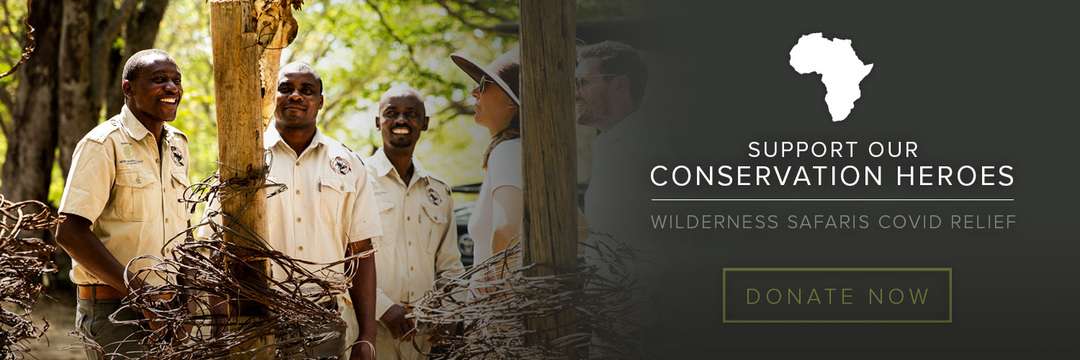Kim Nixon, Wilderness Safaris Botswana MD, describes ‘an increasing scale of hardship’ witnessed in his team’s ongoing outreach to villages surrounding the Okavango Delta, and Bushman families within the Central Kalahari Game Reserve (CKGR), all seriously impacted by the fallout associated with the COVID-19 pandemic. Since mid-April, the team has delivered food hampers to 15 villages and to five Bushman settlements (all 83 families within the Central Kalahari Game Reserve), who also recently received two blankets per family now that night-time temperatures in the Kalahari have plummeted to frigid levels. As at mid-July, the team has delivered more than 900 hampers, feeding an estimate of more than 5 000 people.
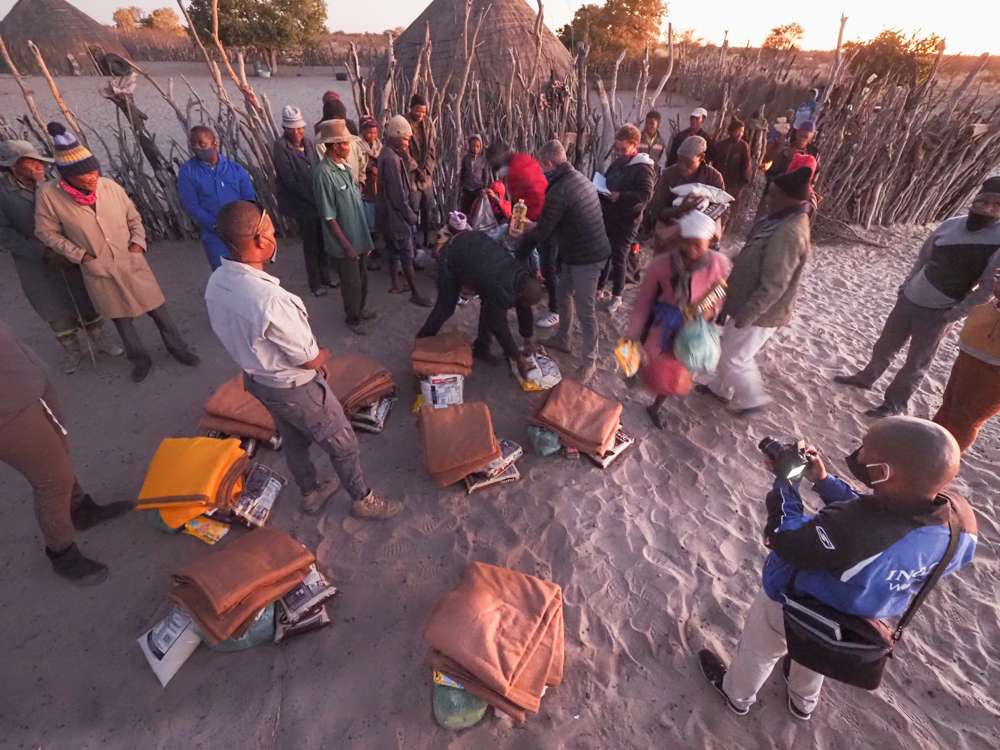
‘People in these villages – deep into rural areas, in extremely hard to get to remote places – are either unemployed, doing subsistence farming (livestock or food staples), or their work is related to tourism or government’, Kim explains. ‘So with the onset of COVID-19 and lockdown, people are staying at home on reduced salaries, or no salary. The amount of money coming into the villages has reduced drastically and supplies in many of these villages/settlements are extremely limited. In a case like this, people appeal to the chief (and other village leadership structures) for help – and that is what happened. The first request for help came from Chief Moalosi of Sankuyo village – he reached out to us’.
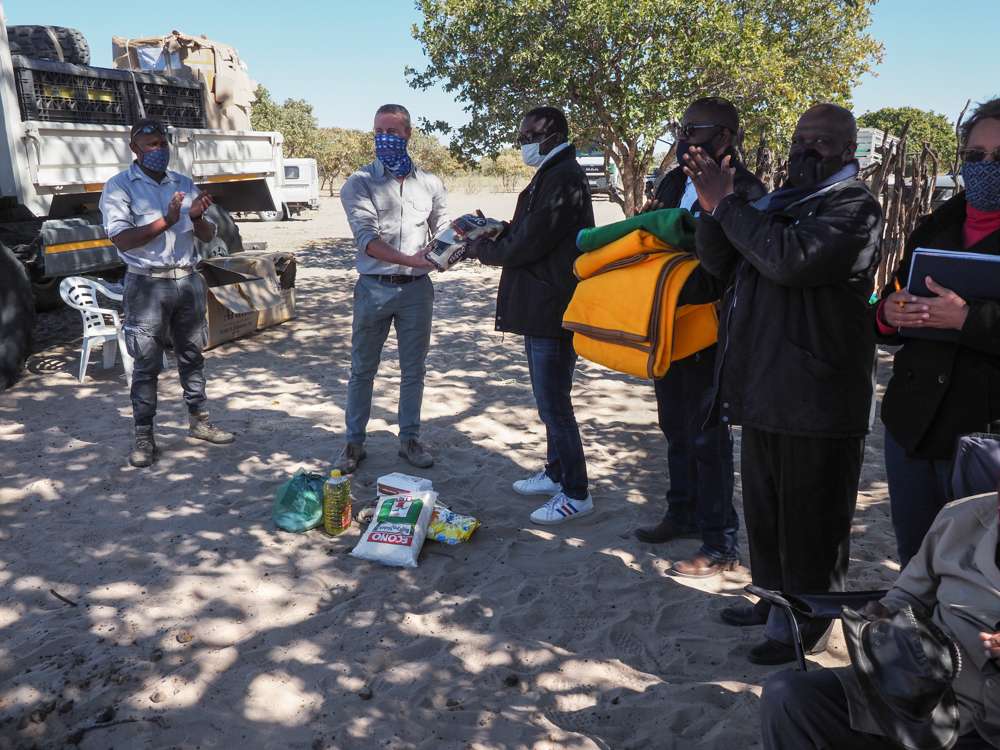
Botswana’s government, through local village leadership, began reaching out to us more frequently for assistance, and we knew that this was a meaningful way that we could directly assist and add to government’s already significant efforts.

‘We wanted to contribute directly to the communities where we have long-term commitments, partnerships, alliances’, Kim says. ‘We work with these communities daily, and many of our colleagues hail from these communities. They are part of the Wilderness Safaris family. Where it has been possible, we have also reacted to requests from communities with whom we do not have commitments or partnerships, as the need for help is spread wide’.
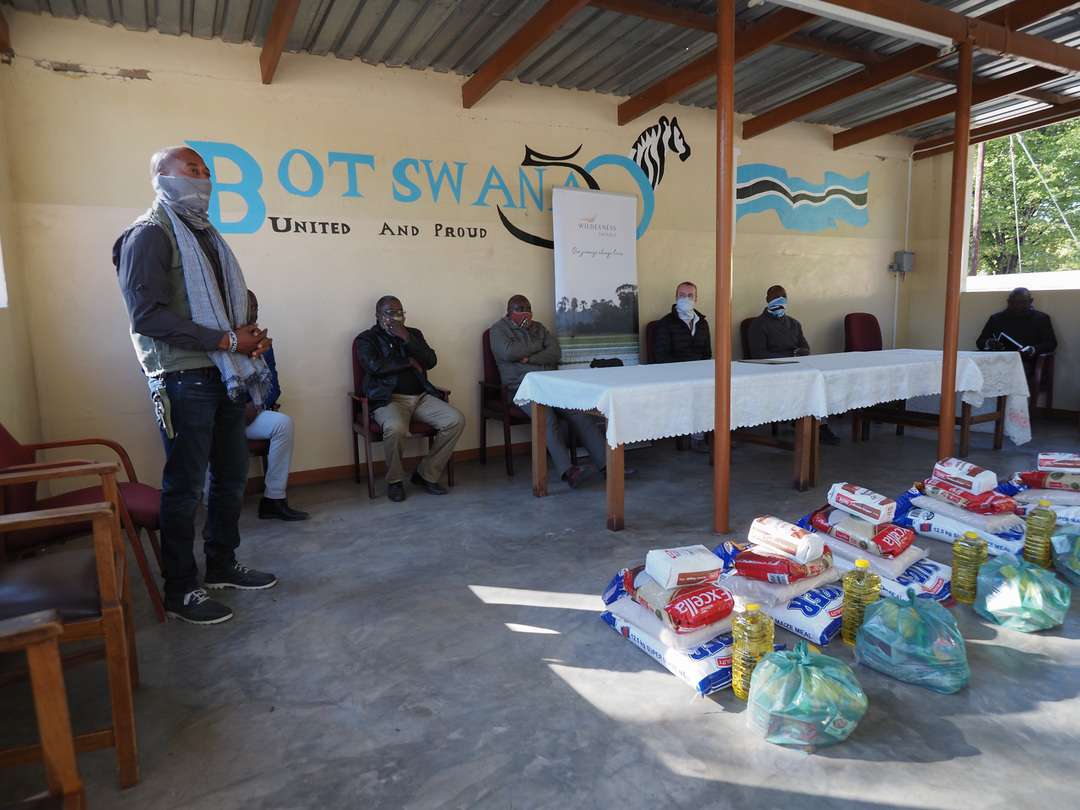




Kim, the food delivery project’s architect, details the hampers’ contents: staples such as beans, maize, rice, sorghum; soap and washing powder; toothpaste and toothbrushes; corned beef; matches; sugar; tea; cooking oil and a few other items. Each hamper can feed a family of four to six for a month, he says, generally providing more nutrition than their regular diet, or at least meaningfully supplementing it. There is, in effect, an official handover to local leadership followed by a personal handover by a team of Wilderness staff (with the social workers and VDC member), to ensure the delivery happens immediately to the needy.
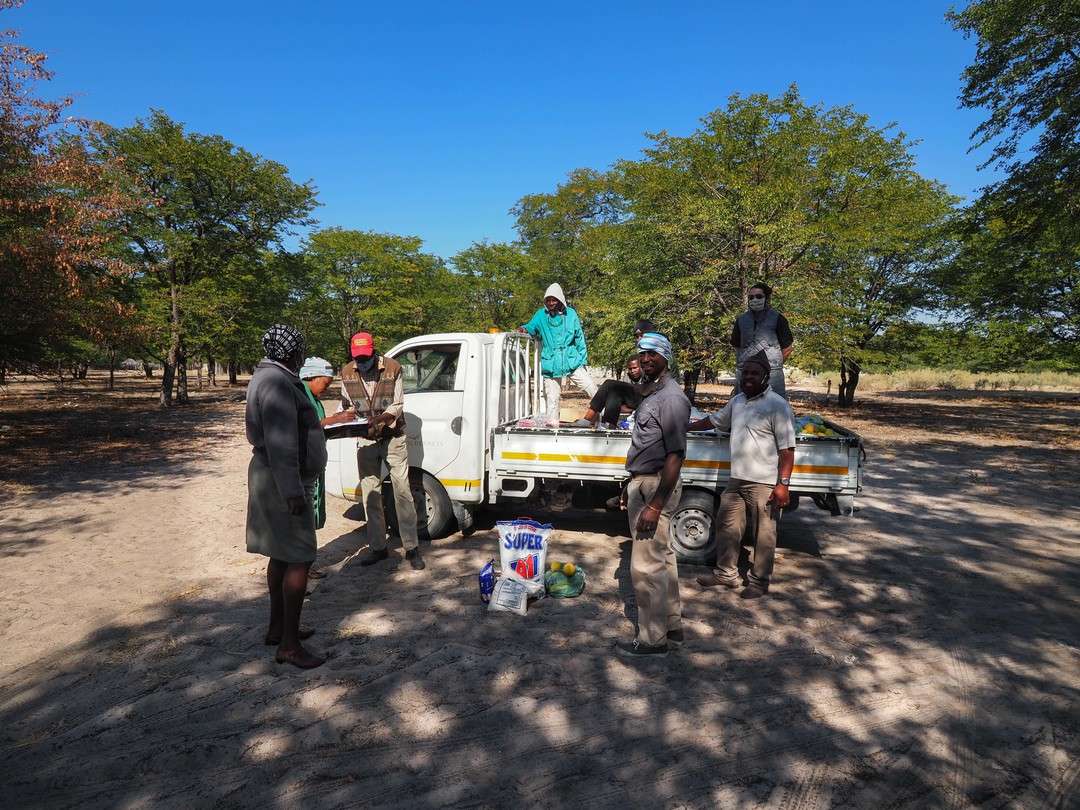
‘We hand over the goods in a ceremony to the chief (and/ or the District Commissioner/ representative) of each village’, he says. ‘And using Wilderness Safaris vehicles and staff, we then help them deliver the hampers to families under the guidance of the local leadership: the chief, the Village District Council (VDC), and the social worker. They’re the ones who have drawn up the list of hamper recipients – we leave it to people in the know’.
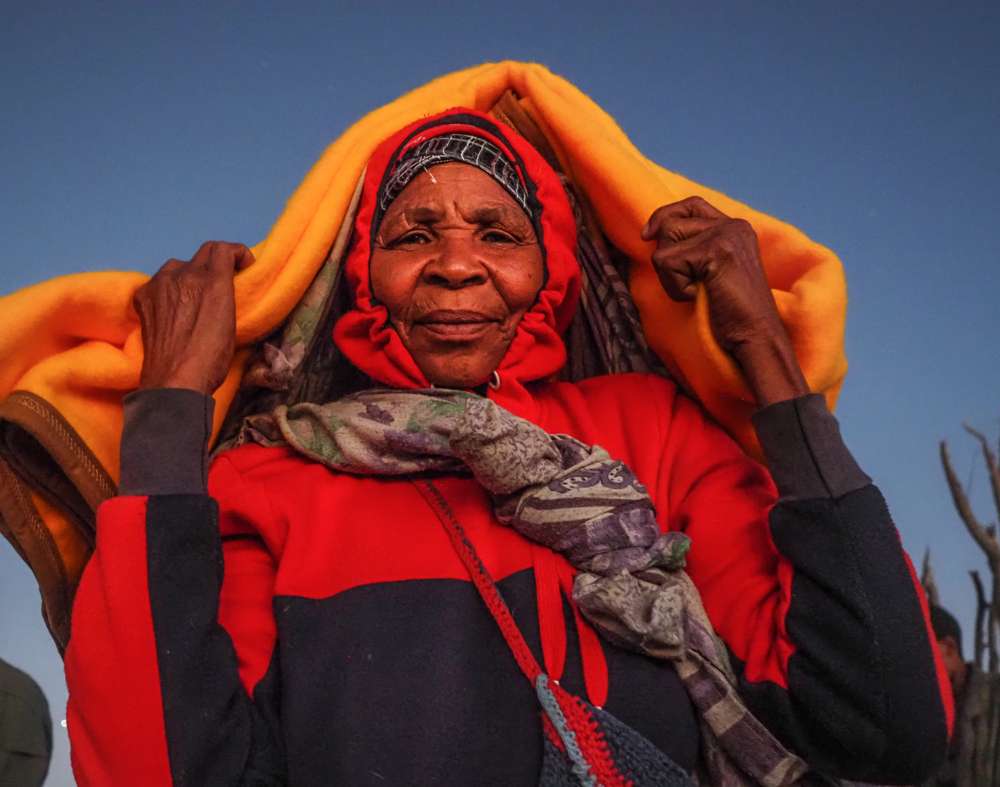
To date roughly P700 000 or USD70 000 has been donated towards hampers, mainly from past guests, our trade partners/representatives and our own staff, Kim says. ‘We guarantee that 100 percent of the money raised is going to hampers for the most vulnerable – and we personally hand deliver them. We make sure that the handover is done correctly and according to the protocols of village leadership. We acknowledge donors – their names are printed on a list handed to the chief and the VDC at each delivery, and they’re also recognised in our reports, with images. It’s as transparent as transparent can be’.
Getting the food to the most needy has presented a host of challenges. ‘It took us 11 hours to drive 500 km to Seronga’, Kim says. ‘Tiring and testing roads, with potholes deep as a donkey standing’.
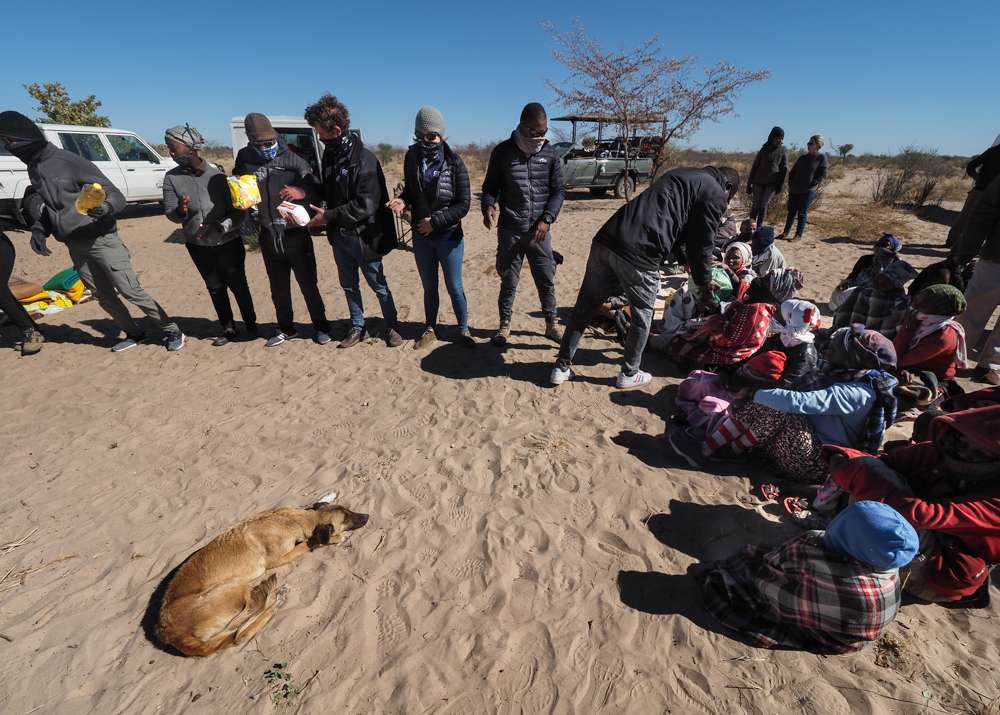
Transfer of goods from one or two ten-ton trucks – donated by Orezone Transport & Logistics for all the deliveries – to smaller Wilderness Safaris vehicles driving to the homesteads has added complexity. In order to fit everything on the big trucks goods are packed loose in large sealable crates – not in the hampers. Everything must be re-packed in the hampers once they reach the village.
‘As we’ve gone along we’ve improved’, Kim says. ‘On our first delivery to Sankuyo, we unloaded all the hampers at the chief’s kgotla, and people had to come and get the contents back to their homes, carrying 30 kilograms worth of goods across the sand. One guy went and got his wheelbarrow. So we started bringing in our own vehicles in order to get the food to the homesteads’.
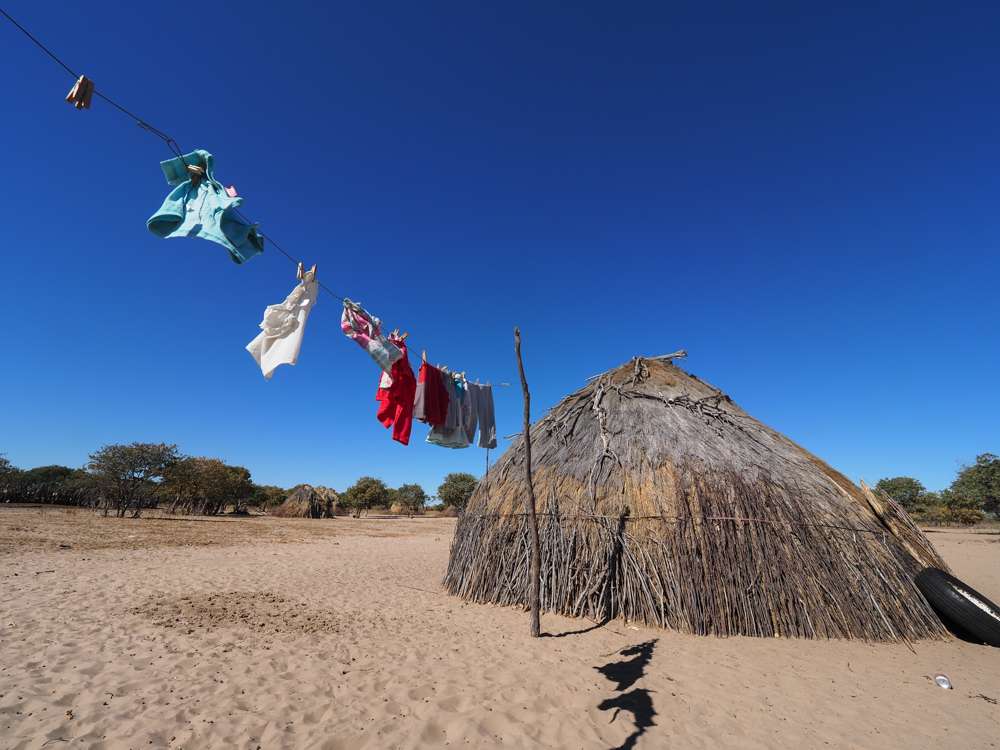
The food deliveries and handovers have also deeply affected the Wilderness team. Meeting people living on one bowl of porridge a day has left indelible impressions.
‘I was not emotionally prepared for what I came to experience’, says Kgabiso Gabanakitso, Wilderness Safaris Botswana Wellness and Retail Manager. ‘I was aware that there is some poverty in these areas, but not as common as what I saw in a few places. On the first day when Kim had joined in and was doing the first handout at Seronga to five elderly folk, I saw first-hand that these people had probably not eaten in a while, they also hadn’t bathed. Even though I had in the past contributed to help alleviate poverty, that was not at the front face of it. I cried that morning seeing what a huge difference our delivery was going to make’.
Patricia Motshereganyi, Wilderness Safaris Training General Manager in Maun, recalls from one village a handicapped man, normally selling airtime from home but unable to do so during lockdown, who crawled to get his food, ‘moving on both legs and hands. He came to the kgotla, and greeted us with a smile…’ And a little boy, tearful when he saw his brother’s ‘car’ – the base of a set of newly delivered toothbrushes – but smiling when Wilderness staff found him one of his own.
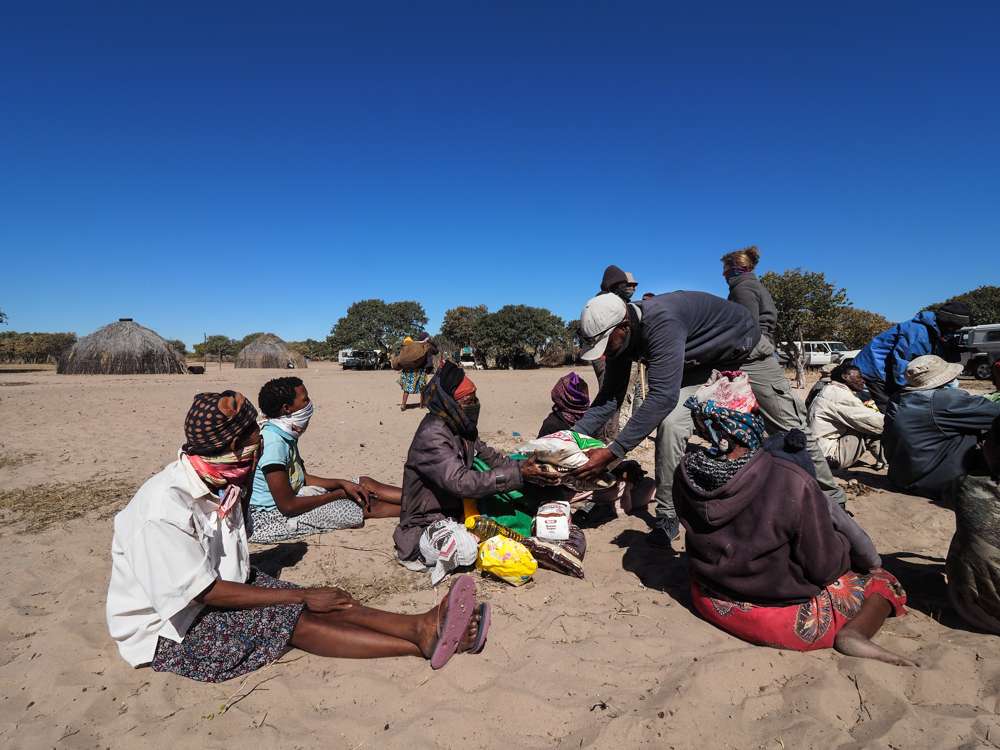
‘The hampers went to the right places at the right time’, Patricia says. ‘We went back to base after interacting with those amazing souls, sat down at the fire to share our highs and lows of the experience and came to the realisation that we work for the same business for a reason. We all were touched by what we saw and how much the food we brought was appreciated. We asked ourselves if we needed all the extras we had whilst other people don’t even have what we can call basics. I am forever grateful and happy to have been part of the team, it was life shifting for me’.
For Wilderness Safaris Botswana Executive Payroll Manager Tana Hutchings, her memories are of lemons. ‘At one of the last homesteads we delivered food to, we found a mother with two small children’, she says. ‘The kids were really dirty (as kids are) and dusty and the little boy’s tracksuit pants were held together with a safety pin – no shoes. They were so excited to receive the food parcels and helped us carry them to their hut. When I gave the smallest one the lemons from the ration pack, his eyes lit up, he could not take his eyes off them and he held onto them as if they were the best gift he’d ever received.
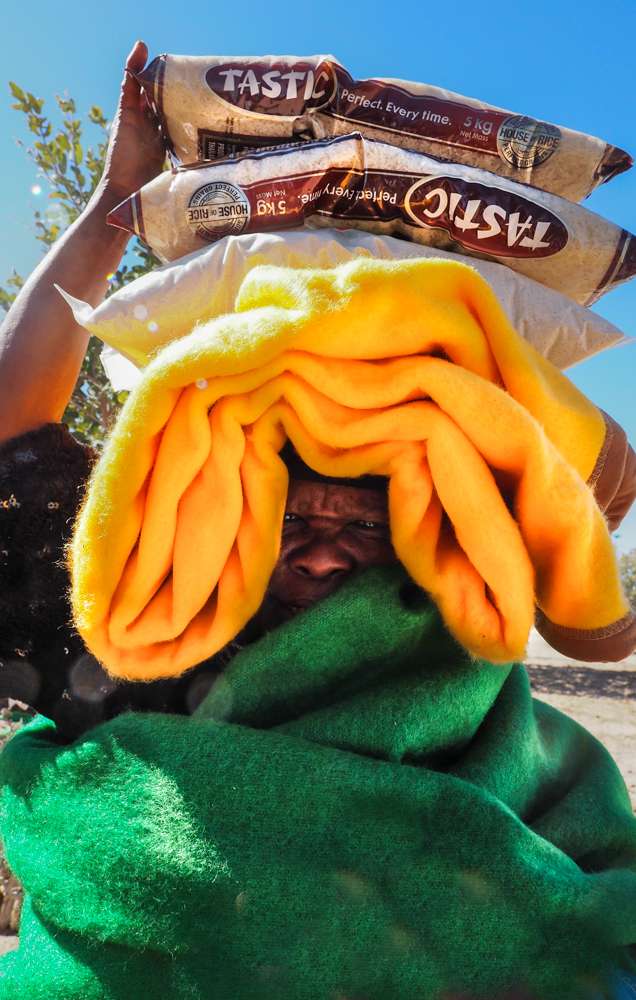
‘As we drove away I looked back and saw him standing there with his two lemons, and the pure joy that they brought him. I couldn’t help but get more out of the truck and put as many lemons as I could into their hands’.
More food deliveries are in the pipeline, Kim says, along with continued assistance with sanitation and water supplies. Although Botswana has not been hit as hard as most countries by COVID-19 – as of early July, there have been 277 reported cases and 1 death – the future may not be so kind.
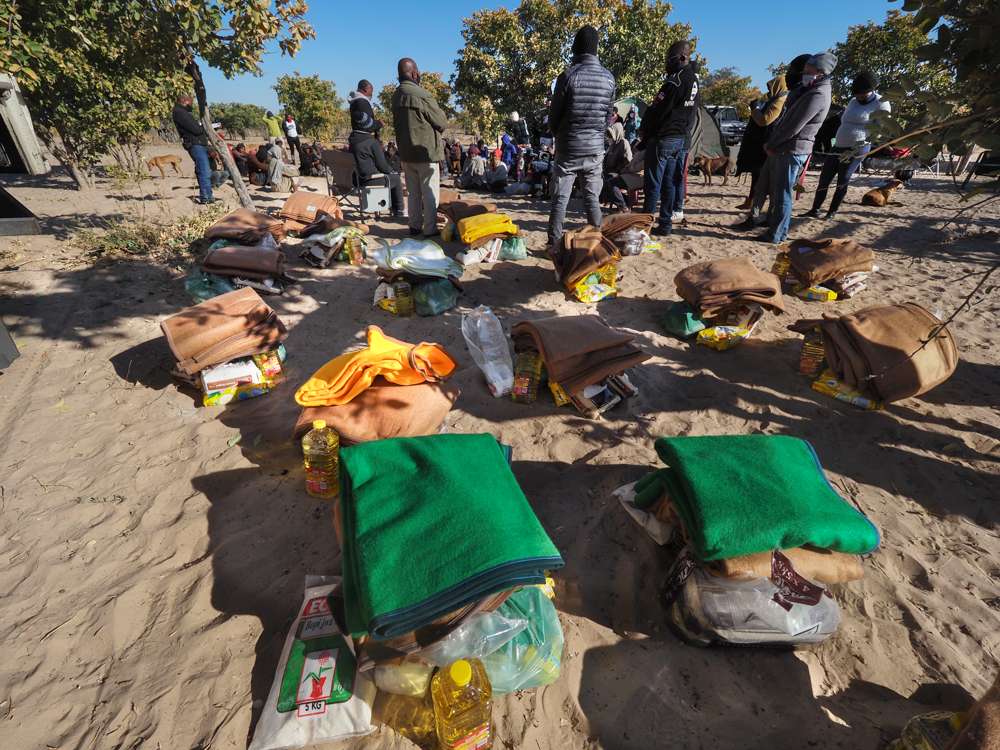
‘I’m hopeful we won’t have to do these deliveries beyond December’, he continues. ‘We believe we have 500-600 more hampers to deliver and continue looking forward to assisting government and working with the local village leadership in ways where we might add our help to their amazing efforts. We’re hoping we’ll get some guest and tourism activity starting by October (beyond our domestic tourism focus) – when the government ends the State of Emergency in Botswana’. At present only four of our camps in Botswana are partially open, and only for domestic tourism – Mombo, King’s Pool, Kalahari Plains, and Santawani.
In mid-July Kim’s team undertook a second delivery of food hampers and blankets to the 83 Bushman families in the CKGR. The first delivery to these families was a handover of hampers to the Ghanzi District Commissioner at Molapo, the vast, desolate reserve’s largest settlement. ‘This time’, Kim says, energised, ‘we handed the hampers over to the Ghanzi Council Chairperson and the Council Secretary, afterwards handing over each of the food hampers together to each family, but this time, including desperately needed blankets in the zero Centigrade weather at this time of year’…
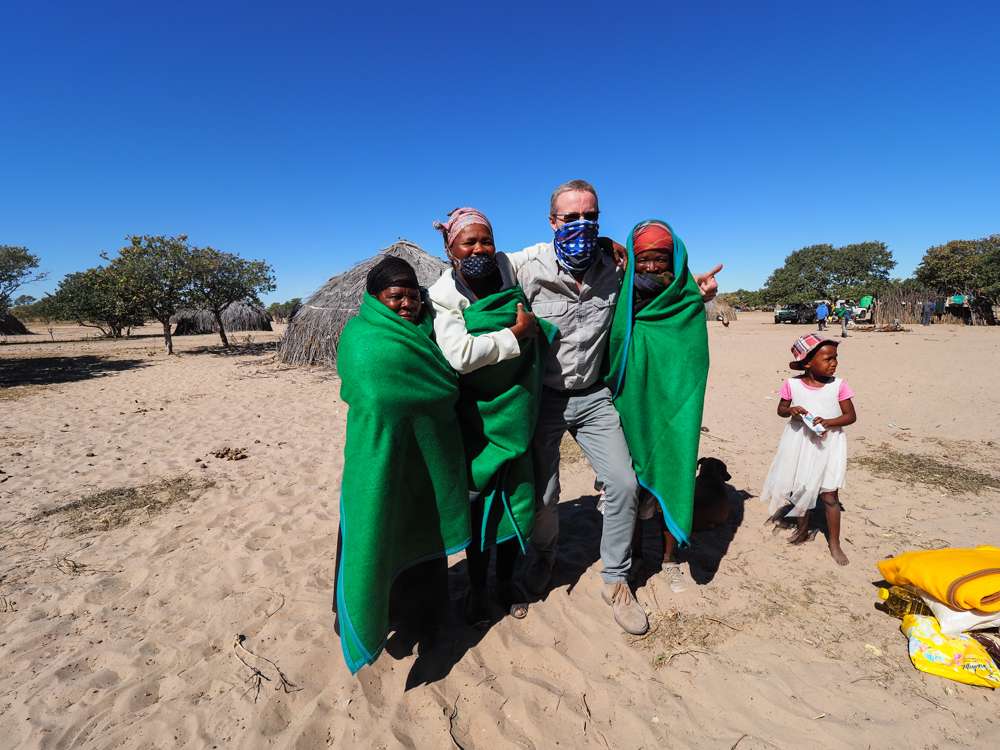
All in the spirit, shared by the rest of the Wilderness Safaris Botswana team, of compassion, community, commitment.
‘There’s a need for us to move from “me” to “us”’, Patricia reflects. ‘The “us” means including your neighbour. Food for thought…’
written by Melissa Siebert and Photographed by Dave Luck
SUPPORT OUR CONSERVATION HEROES
Wilderness Safaris COVID Relief
The impact of COVID-19 in Africa has been profound – particularly on wildlife conservation and rural communities dependent on tourism. Please join us to support our Conservation Heroes. Together we are stronger, and together, we can continue to change lives. It only costs USD50 to feed a family for a month. Or USD5 000 to cover the monthly operations of an anti-poaching team. Every single contribution, no matter how big or small, makes a significant difference.
To learn more about Wilderness Safaris COVID relief efforts, click here

Let’s plan your next journey
Ready?
When we say we’re there every step of the way, we mean it, literally. From planning the perfect circuit, to private inter-camp transfers on Wilderness Air, and easing you through Customs. We’re with you on the ground, at your side, 24-7, from start to finish. Ready to take the road less travelled? Contact our Travel Designers to plan an unforgettable journey.
